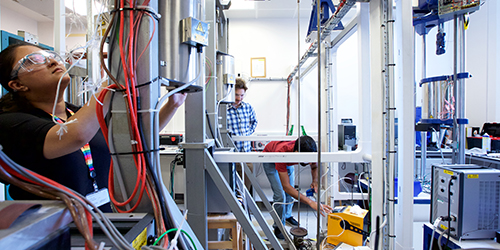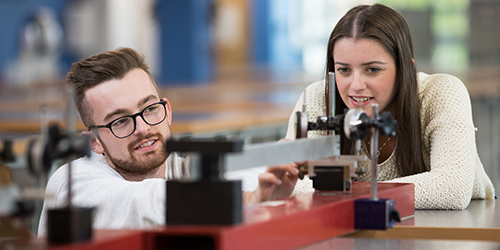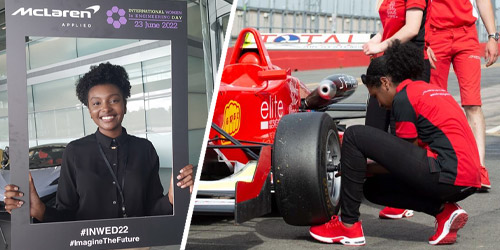Mechanical Engineering
Mechanical engineers are at the forefront of future technologies. They apply the laws of maths and physics to create everything from handheld consumer devices to wind farms.
Cutting-edge facilities
Access the largest robotics lab in the UK; the Hele-Shaw fluid mechanics laboratory; and our state-of-the-art engines and propulsion laboratory.
Outstanding reputation
Mechanical Engineering at Bristol is ranked 7th in the UK in the Guardian University Guide 2024.
Industry connections
We have valuable links with world-class local engineering and tech companies, and you'll engage with industry from the very start of your studies.
Mechanical Engineering courses for 2025
Single Honours
- BEng Mechanical Engineering (H305)
- BEng Mechanical Engineering with a Year in Industry
- BEng Mechanical and Electrical Engineering (H361)
- MEng Mechanical Engineering (H300)
- MEng Mechanical Engineering with Study Abroad
- MEng Mechanical Engineering with a Year in Industry
- MEng Mechanical and Electrical Engineering (H360)
- MEng Mechanical and Electrical Engineering with a Year in Industry ()
Mechanical Engineering at Bristol
Mechanical systems make all our machines work, from satellites to miniature cameras. Mechanical engineers design and implement practical solutions for products and processes, making the best use of new materials and technologies. If you like using science to solve real-world problems and have a flair for design and creative thinking, this is the subject for you.
The research in mechanical engineering covers diverse topics, such as advanced materials for aero-engines, adaptive control systems theory, and energy studies in power stations. You will benefit from teaching influenced by the latest developments and expertise, for example through work with the Bristol Robotics Laboratory, which is the largest robotics lab in the UK.
Engineering students at Bristol also benefit from a dedicated Industrial Liaison Office, which assigns every student an industrial mentor - an experienced engineer working in industry. They will share their experience, give advice on careers, and offer information about what skills employers are looking for. The Industrial Liaison Office also helps students find internships with companies.
There is also strong industrial demand for skilled engineers able to span both mechanical and electrical engineering disciplines. If you are interested in integrating key aspects of both of these areas, explore our Mechanical and Electrical Engineering courses listed above.
I enjoy the passion of the lecturers when they explain their subject, and the mix of lectures and labs that we have. It's great to see what we learn. Bristol is beautiful in a special way - it's so vibrant.
Career prospects

Our courses are fully accredited by the Institution of Mechanical Engineers. Upon completion, you will have already met part (BEng) or all (MEng) of the benchmark academic requirements for becoming an Incorporated (IEng) or Chartered Engineer (CEng).
Our graduates are in high demand by industry and often promoted quickly to senior positions around the world. The course is ideal preparation for traditional career paths such as aerospace, building, automotive, medical, marine and defence industries. Skills in team working, report writing and creativity can also open doors in business, finance, law, the civil service and more. Graduate occupations include:
- Graduate Design Engineer
- Technical Analyst
- Graduate Mechanical Engineer
- Platform Development Engineer
- Analyst.
Our graduates have gone on to work for companies including Airbus, Arup, E.ON, KPMG, Network Rail and Rolls-Royce.
Our passionate teaching staff encourage students to turn some of the amazing concepts, devices and artefacts they work on during their final-year projects into viable commercial propositions. Several of our mechanical engineering students go on to start their own businesses.
Course structure

Our three-year BEng degree provides a grounding in all aspects of modern engineering. The MEng course offers the same quality experience, with the final two years focusing strongly on project work.
Across all our mechanical engineering degrees, first and second-year teaching is based on four main themes: design and manufacture; dynamics and control; thermofluids; and materials. In the first two years, you are introduced to the fundamentals of engineering science and their application to real problems, including creative design units.
A major project in year three involves applying the principles covered in years one and two to tackle real-world engineering problems. These projects range from designing devices to reduce the impact of gusts on wind turbines, to developing testbeds for medical prostheses.
For MEng students, the fourth-year major group project is designed to replicate the sort of open-ended task and situation that working engineers encounter. Previous projects have seen students program industrial-scale robots to interact with humans, conceive new systems for removing plastic from rivers, and 3D print carbon-fibre bike frames.
Supportive community

Our students, staff and researchers come from countries across the world, so you'll benefit from a rich cultural diversity. We're proud of our inclusive and welcoming learning environment. Respecting different ways of thinking and working is especially important in teamwork, a big part of our practice-based curriculum and an important employability factor.
MechSoc, the official society for mechanical engineering, is run by our students with the aim of encouraging social and professional development.



